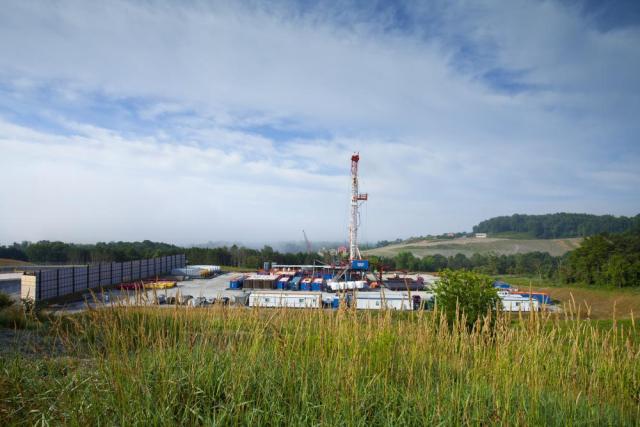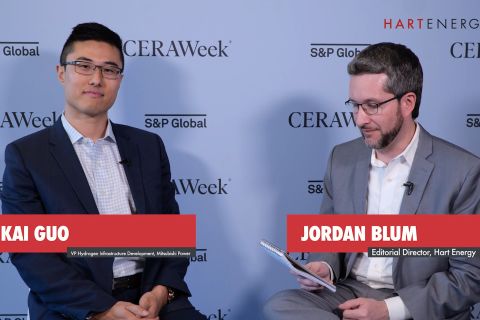
A drilling rig on EQT acreage in Pennsylvania’s Greene County. EQT owns or leases approximately 610,000 net acres in Pennsylvania, according to its website, with the majority of the acreage located in the southwestern region of the state in Greene and Washington counties. (Source: EQT Corp.)
U.S. shale gas producer EQT Corp. unveiled a pilot on Jan. 28 that aims to create a differentiated commodity: “responsibly sourced natural gas” (RSG).
Under the terms of the pilot, EQT will seek to produce RSG through third-party certification of two of its wellpads, accompanied by continuous methane emissions monitoring of the pads. Project Canary, an international environmental standards company based in Denver, will provide TrustWell certification of EQT’s selected pads and continuous, real-time methane emissions monitoring.
EQT, whose operations focus in the cores of the Marcellus and Utica shale plays in the Appalachian Basin, said the intent of the pilot is to show that natural gas can be, and is, produced with high environmental and social standards, and that global energy market demand exists and is growing for these differentiated RSG products.
“This partnership aligns with our commitment to ESG leadership and to meeting the evolving needs and expectations of our stakeholders,” EQT CEO Toby Z. Rice said in a statement on Jan. 28.
In a recent interview with Oil and Gas Investor, Rice noted that a strong ESG performance will be key to long-term value creation for shareholders and also something that differentiates EQT from other shale producers.
“We have one of the lowest methane emissions intensity levels across the entire country,” he said. “Give plugs to our peers, Appalachia is one of the best places environmentally to produce natural gas. It lets people understand that we are the hydrocarbon of the future.”
“This is the key to achieving a lot of the climate goals,” he added.
Project Canary’s “Canary X” devices will be installed on EQT’s two selected pads to measure methane concentrations at the site level every second and communicate the results to a cloud database every minute. The TrustWell certification scores more than 300 points related to production practices, including air, land, water and waste management, as well as drilling and completion processes.
The third-party validation from Project Canary will allow EQT to achieve the highest possible industry standards for RSG and add additional trusted data to ESG ratings, according to joint release by the two companies.
Social impacts on the community will also be evaluated for the pilot project, the companies added.
Project Canary believes a market is beginning to develop in North America for lower emission gas and it will fetch a premium in supply agreements with utilities and other downstream buyers. The company’s goal, according to the joint release, is to mitigate climate change by helping the oil and gas industry operate on a cleaner, more efficient, more sustainable basis.
In a statement on Jan. 28, Project Canary CEO Chris Romer commented, “Stakeholders and investors continue to expect and demand more transparency, more verifiable trusted data, and more overall ESG-related performance progress across the energy sector. This pilot project, which will utilize our differentiated technology to provide trusted and independent data, demonstrates continued responsiveness toward meeting and exceeding those growing stakeholder demands.”
A global energy company has agreed under terms of the confidential pilot to purchase a portion of the RSG produced from the pilot, the joint release said.
Project Canary partners with the Colorado School of Mines Payne Institute to develop a collaborative environment for oil and gas companies and external parties to share best practices and insights garnered through continuous monitoring.
Based in Pittsburgh, EQT is the largest producer of natural gas in the United States. The company operates acreage positions in Pennsylvania, West Virginia and Ohio.
Recommended Reading
Exclusive: Building Battery Value Chain is "Vital" to Energy Transition
2024-04-18 - Srini Godavarthy, the CEO of Li-Metal, breaks down the importance of scaling up battery production in North America and the traditional process of producing lithium anodes, in this Hart Energy Exclusive interview.
High Interest Rates a Headwind for the Energy Transition
2024-04-18 - Persistent high interest rates will make transitioning to a net zero global economy much harder and more costly, according to Wood Mackenzie Head of Economics Peter Martin.
Scotland Ditches 2030 Climate Target to Cut Emissions by 75%
2024-04-18 - Scotland was constrained by cuts to the capital funding it receives from the British government and an overall weakening of climate ambition by British Prime Minister Rishi Sunak, said Mairi McAllan, the net zero secretary for Scotland's devolved government.
Exclusive: Mitsubishi Power Plans Hydrogen for the Long Haul
2024-04-17 - Mitsubishi Power is looking at a "realistic timeline" as the company scales projects centered around the "versatile molecule," Kai Guo, the vice president of hydrogen infrastructure development for Mitsubishi Power, told Hart Energy's Jordan Blum at CERAWeek by S&P Global.
Google Exec: More Collaboration Needed for Clean Power
2024-04-17 - Tech giant Google has partnered with its peers and several renewable energy companies, including startups, to ramp up the presence of renewables on the grid.




